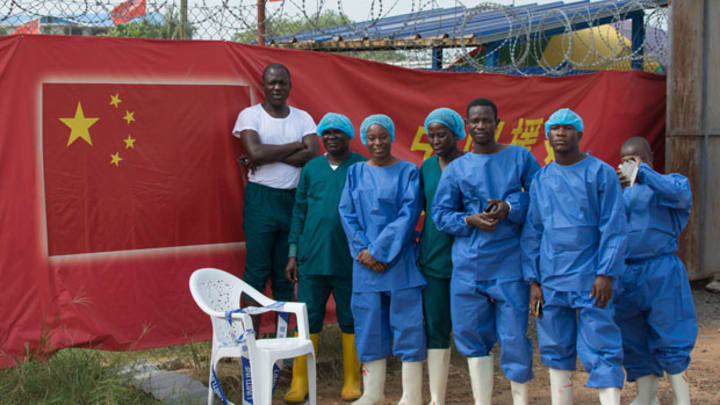
The Ebola crisis was a tragic awakening for people around the world about the crucial importance of strong health systems. The numbers are staggering. As a result of the virus — and the weak systems that were unable to contain it — more than 10,000 people have died in West Africa. The social impact of such a large-scale health crisis is incalculable, and the devastating economic fallout in the region will be felt for some time.
China played an early and significant role in responding to the crisis, and was among the first countries to send aid and medical workers to the region. As the world now reflects on how local and international partners and coalitions can together strengthen health systems and prevent the next outbreak, China will play an increasingly important role in the discussion.
China is working hard to build health systems capable of providing universal health coverage at home, pledging $125 billion to increase access to primary health care across the country. The government has committed to ensuring that all Chinese people are covered by health insurance, and is also undertaking reforms to ensure a safety net for the poorest.
Beyond its own borders, China has also been working to strengthen health systems across Africa, with a growing focus on supporting African countries as they work toward universal access to care.
China and Africa’s collaborative focus on UHC is novel, but also builds on a long history of Chinese health engagement in Africa. Since 1963, China has partnered with over 40 African countries to build health infrastructure, distribute Chinese health products and provide care through Chinese medical teams. Now, China is partnering with African governments to build their own capacity, focusing on technology transfers, pharmaceutical capacity around essential medicines and opportunities to train African health personnel. Given the flat or declining health aid budgets from traditional donors, China’s investments will be an essential part of achieving UHC across Africa.
The success that China is beginning to have in expanding health coverage at home is particularly fertile learning territory for Africa, given that both regions are tackling these issues now; it also makes it a particularly valuable partner for African countries.
Both regions are tackling similar public health challenges, and learning crucial lessons along the way. Between 2006 and 2012, the proportion of Chinese with health insurance more than doubled to 95 percent, thanks to the introduction of an innovative, tiered insurance system that specifically targets urban, rural and the poorest populations. With increased public investment, the proportion of health costs paid out of pocket in China has decreased from 52 percent to 34 percent in the past decade. There is now a large network of local clinics covering much of the country, including numerous hard-to-reach rural areas. In many ways, as countries around the world wrestle with universal health coverage, China’s efforts are ahead of the curve.
African countries can learn as much from China’s ongoing struggles as from its remarkable successes. Despite progress, many rural areas in China still lack access to quality services, and copayments remain high enough that financial risk protection is limited. With ballooning health care costs, there is continuing uncertainty about the role of the marketplace in managing hospitals and services.
There is great potential for Chinese and African public health professionals and policymakers to think together about how to ensure that coverage in large, low-income settings can be not just broad but deep, and how to develop delivery systems that can provide people with the services they need without catastrophic costs. The discussions required to sustain this kind of collaboration will take place at a variety of levels, from the technical to the political, and involve diverse stakeholders.
Recently, the fifth International Roundtable on China-Africa Health Collaboration was held in Beijing and focused on universal health coverage. It was the first time that Chinese and African partners had officially met to discuss the scale, scope and future of this crucial issue. The meeting produced a set of policy recommendations intended to guide future cooperation. They included a commitment to working with a range of partners on UHC, particularly the private sector, and for the first time, a proposal to monitor and evaluate these efforts.
The scale of China’s ambition and the range of its partners mean that the country is certain to be an important collaborator in development in Africa, still home to the world’s most pressing health challenges. As the Ebola crisis has demonstrated, the entire world is vulnerable when weak health systems are allowed to persist. China and Africa’s partnership has the potential to drive real progress on this vital issue, as they work together to develop resilient systems across continents and contexts.
Join the Devex community and access more in-depth analysis, breaking news and business advice — and a host of other services — on international development, humanitarian aid and global health.




